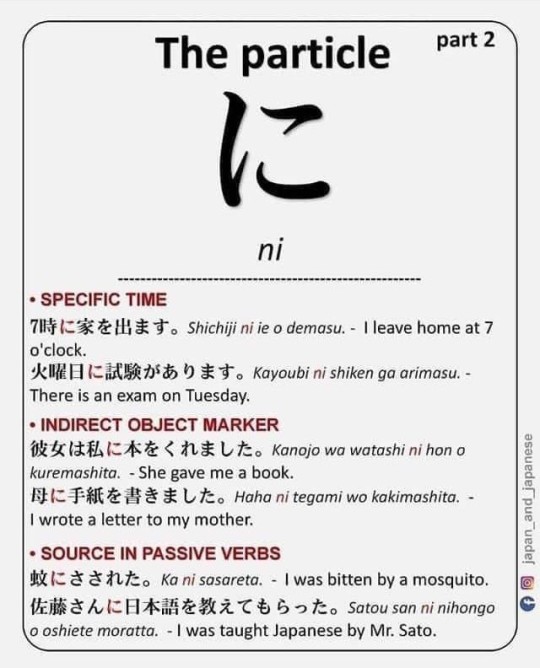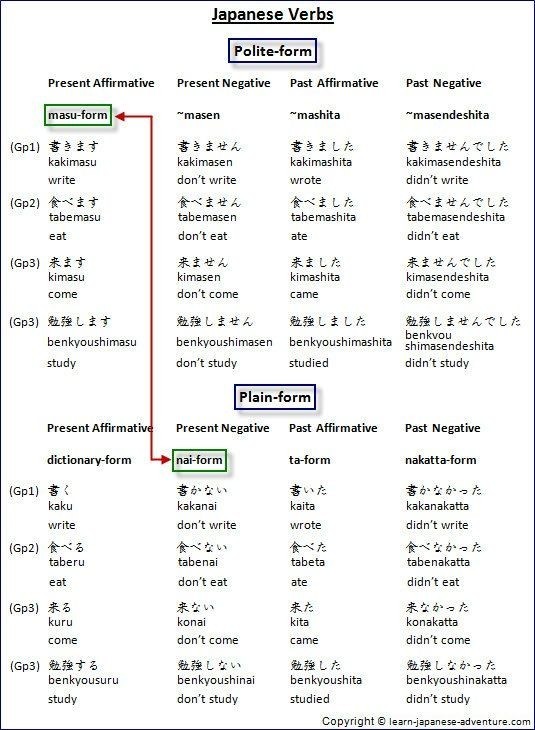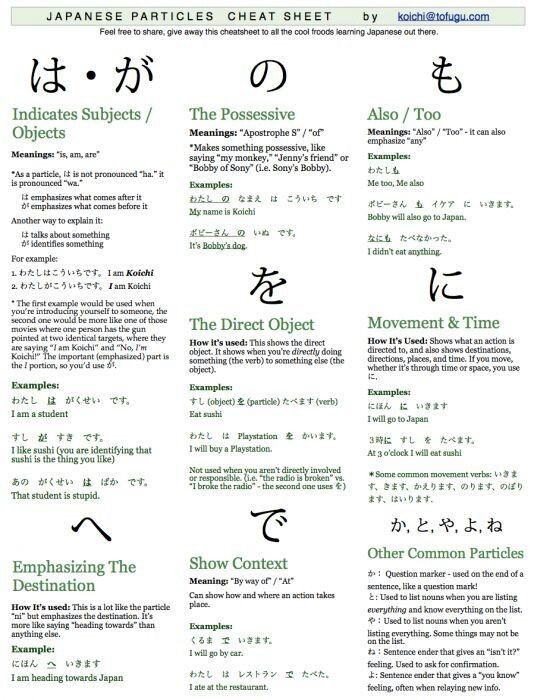Text
Are you an intermediate or advanced Japanese language learner looking for things to practice reading? I found this cool website called WURK @ https://eigobu.jp/. Their subtitle is 働くあなたのため学びのメディア which if you do/don’t need help translating it… might help you figure out if this site is for you.
On the left you’ll find 5 main categories:
日本語
英語
心理
教養
テクノロジー
Lately, I’ve been reading about Japanese internet slang ネット用語 under 日本語. I have no shame in saying I read sentences more than twice. I don’t have a lot of reading material or access to borrow them so I’m not too hard on myself, we all have to start somewhere. Anyway, the link to that specific category is here: https://eigobu.jp/magazine/category/internet-slang
I don’t normally make these posts, but I hope someone can make good use of it too.
108 notes
·
View notes
Text
「習う」と「学ぶ」の違いは何?
what’s the difference between these two verbs for “to learn”?
well, as it turns out, the difference has to do with how you learned the information you’re referring to—namely, whether you learned from another person or not. check out this explanation from a hinative thread:
習う・・・人から教わる(おそわる)こと / to be taught by someone
学ぶ・・・知識や技芸を身につけること / to acquire some knowledge or skill
学ぶには、学習する、勉強するという意味もあります / 学ぶ can also mean to 学習する or 勉強する.
so, 習う is for things you learn from people and 学ぶ is for things you learn from books, etc., or as a synonym for studying. here are some examples (from the same hinative thread):
本を読んで英語を学びました。 (never 習いました)
ピアノを母から習いました。 (not 学びました)
example 1 specifies that the new information comes from a book, while example 2 specifies that it comes from the speaker’s mom. it seems like such a fundamental difference between the two, but i know i for one had never heard of it before!
anyways, i hope this quick little lesson was helpful. また今度ね!
155 notes
·
View notes
Text
青 ・漢検10級
あお
セイ
ショウ
青 「あお」 blue
青息吐息 「あおいきといき」
青鷺 「あおさぎ」 grey heron
青磁 「せいじ」 celadon porcelain
青写真 「あおじゃしん」 blueprint
青畳 「あおだたみ」 new tatami mat
青天井 「あおてんじょう」 blue sky, skyrocketing
青菜 「あおな」 greens
青鈍 「あおにび」 green-tinged grey
青海苔 「あおのり」 green seaweed
青苔 「せいたい」 green moss
青蠅 「あおばえ」 bluebottle fly
青雲 「せいうん」 blue sky
青果 「せいか」 produce, fruits and vegetables
青史 「せいし」 written history
青春 「せいしゅん」 youth
青天白日 「せいてんはくじつ」 being found innocent
青年 「せいねん」 youth, young man
青銅 「せいどう」 bronze
群青 「ぐんじょう」 ultramarine
紺青 「こんじょう」 prussian blue
丹青 「たんせい」 red and blue
緑青 「ろくしょう」 Verdigris, copper oxidation
69 notes
·
View notes
Text
Russian invasion of Ukraine vocabulary in Japanese

ウクライナ - Ukraine
キエフ - Kyiv
ドンバス - Donbas
ドネツク / ドネツィク - Donetsk
ルハーンシク - Luhansk
クリミア、 クリミア半島 [クリミアはんとう] - Crimea, Crimean peninsula
チェルノブイリ / チョルノーブィリ - Chernobyl
ロシア - Russia
ベラルーシ - Belarus
大統領 [だいとうりょう] - president
軍隊 [ぐんたい] - military, troops, armed forces
兵士 [へいし] - soldier
分離主義者 [ぶんりしゅぎしゃ] - separatist
反乱者 [はんらんしゃ] - rebel
民間人 [みんかんじん] - civilian
難民 [なんみん] - refugee
国際連合 [こくさいれんごう] - United Nations
欧州連合 [おうしゅうれんごう] - European Union
北大西洋条約機構 [きたたいせいようじょうやくきこう] - NATO
軍事同盟 [ぐんじどうめい] - military alliance
同盟国 [どうめいこく] - allied nation
欧米 [おうべい] - the West; Europe and America
敵 [てき] - enemy
主権 [しゅけん] - sovereignty
領土保全 [りょうどほぜん] - territorial integrity
自決 [じけつ] - self-determination
自衛権 [じえいけん] - right of self-defense
武器庫 [ぶきこ] - armory
部隊 [ぶたい] - troops, force
プロパガンダ - propaganda
軍事演習 [ぐんじえんしゅう] - war games
口実 [こうじつ] - excuse
脅威 [きょうい] - threat
核兵器 [かくへいき] - nuclear weapon
平和維持 [へいわいじ] - peacekeeping
ジェノサイド - genocide
ナチズム - nazism
特殊軍事作戦 [とくしゅぐんじさくせん] - special military operation
非武装化 [ひぶそうか] - demilitarization
要求 [ようきゅう] - demand
安全保証 [あんぜんほしょう] - security guarantee
スピーチ / 演説 [えんぜつ] - speech
戦争 [せんそう] - war
侵攻 / 侵略 [しんこう / しんりゃく] - invasion
戦闘 [せんとう] - battle, fight, combat
非常事態 [ひじょうじたい] - state of emergency
戦争状態 [せんそうじょうたい] - state of war
動員 [どういん] - mobilization
外出禁止令 [がいしゅつきんしれい] - curfew
抵抗 [ていこう] - resistance
発砲 [はっぽう] - firing
攻撃 [こうげき] - attack
砲撃 [ほうげき] - bombarding, shelling
爆発 [ばくはつ] - explosion
武器 / 兵器 [ぶき / へいき] - weapon
ミサイル - missile
ロケット弾 [ロケットだん] - rocket
爆弾 [ばくだん] - bomb
火炎瓶、 モロトフ・カクテル [かえんびん] - Molotov cocktail
戦車 [せんしゃ] - tank
ヘリコプター - helicopter
航空機 [こうくうき] - aircraft
サイバー攻撃 [サイバーこうげき] - cyberattack
シェルター / 防空壕 [ぼうくうごう] - shelter, air-raid shelter
サイレン - siren
警告 [けいこく] - alarm, alert, warning
制裁 [せいさい] - sanction
対抗策 [たいこうさく] - countermeasure, counteraction
反戦の [はんせんの] - anti-war
デモ / デモンストレーション - protest
支援 [しえん] - support, backing, aid, assistance
交渉する [こうしょうする] - to negotiate
独立を宣言する [どくりつをせんげんする] - to declare independence
武装する [ぶそうする] - to arm, to get equipped with weapons
脅かす [おどかす] - to threaten
挑発する [ちょうはつする] - to provoke
違反する / 侵害する [いはんする / しんがいする] - to break; to violate
宣戦布告する [せんせんふこくする] - to declare war
攻撃する [こうげきする] - to attack
侵攻する [しんこうする] - to invade
占領する [せんりょうする] - to occupy
包囲する [ほういする] - to siege
人質に取る [ひとじちにとる] - to take as hostage
戦う [たたかう] - to fight; to make war (on)
発砲する [はっぽうする] - to fire, to shoot
撃つ [うつ] - to shoot
射殺する [しゃさつする] - to shoot (to death)
破壊する [はかいする] - to destroy
武装を解除する [ぶそうをかいじょする] - to disarm
防衛する [ぼうえいする] - to defend
抵抗する [ていこうする] - to resist
非難する [ひなんする] - to condemn
干渉する [かんしょうする] - to intervene, to interfere
避難する [ひなんする] - to evacuate
逃れる [のがれる] - to flee, to escape
撤退する [てったいする] - to retreat, to withdraw
降参する [こうさんする] - to surrender, to capitulate
抗議する [こうぎする] - to protest
逮捕する [たいほする] - to arrest
負傷する / 怪我をする[ふしょうする / けがをする] - to get injured
死亡する / 死ぬ [しぼうする / しぬ] - to die
82 notes
·
View notes
Photo
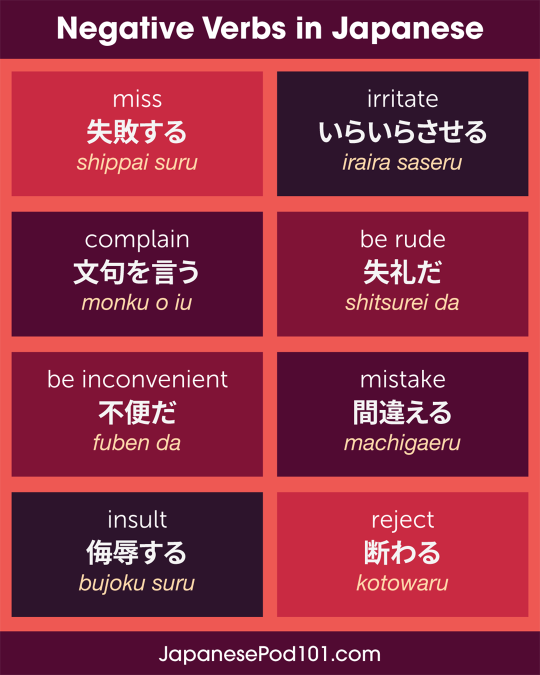
Negative Verbs in #Japanese! 😡😤 PS: Learn Japanese with the best FREE online resources, just click here: https://www.japanesepod101.com/?src=tumblr_negative-verbs_image_021621
191 notes
·
View notes
Text
just a list of idioms i wrote down while watching my childhood anime
諸行無常 - all things must pass; all worldly things are impermanent (Buddhist term)
恐悦至極 - extremely delighted (humble speech)
開口一番 - at the very beginning of one’s speech; the first thing (one) says after opening the mouth
悪鬼退散 - Evil spirits, begone!
百戦錬磨 - veteran; battle-worn; schooled by adversity in many battles; rich in experience
天地神明 - the gods of heaven and earth
笑止千万 - highly ridiculous; quite absurd
災難即滅 - may misfortune leave promptly
先手必勝 - victory goes to the one who makes the first move; being quick to take action leads to victory; the early bird gets the worm
空前絶後 - (so marvellous or horrible that it may be) the first and probably the last
初戦突破 - advancing to the next stage; breaking through the first match
生者必滅 - all living things must die (Buddhist term)
主客転倒 - reversing the order of importance; putting the cart before the horse; the tables being turned; mistaking the insignificant for the essential; mistaking the means for the end
背水の陣 - fighting with one’s back to the wall; having burnt one’s bridges; last stand
奇々怪々 - very strange; bizarre; weird; mysterious
驚天動地 - astounding; startling; world-shaking; amazing; earth-shattering
147 notes
·
View notes
Text
ハウルの動く城

暖炉「だんろ」 fireplace, hearth, stove
荒地「あれち」 wasteland, abandoned land
弱虫「よわむし」 coward, weakling, wimp, sissy
魔力「まりょく」 magical powers, spell, charm
軍艦「ぐんかん」 warship, battleship
長女「ちょうじょ」 eldest daughter, first-born daughter
魔女「まじょ」 witch
決戦「けっせん」 decisive battle, deciding match, play-off
能弁「のうべん」 eloquence, oratory
山小屋「やまごや」 mountain hut
隠れ家「かくれが」 hiding place, hideout, retreat, hideaway
雨漏り「あまもり」 roof leak
肩掛け「かたかけ」 shawl
回し者「まわしもの」 spy, secret agent
心変わり「こころがわり」 change of heart, change of mind
中折れ「なかおれ」 felt hat, fedora; being interrupted or broken in the middle
帽子屋「ぼうしや」 hat shop, hatter, hatmaker
掃除婦「そうじふ」 cleaning woman
悪知恵「わるぢえ」 craft, cunning, guile, serpentine wisdom
我楽多「がらくた」 junk, rubbish, trash, garbage, odds and ends
魔方陣「まほうじん」 magic square
薄情者「はくじょうもの」 heartless, insensitive person
影武者「かげむしゃ」 body double
咳き込む「せきこむ」 to cough violently, to have a coughing fit
空襲警報「くうしゅうけいほう」 air-raid alarm
99 notes
·
View notes
Text
JLPT N1 words for describing people
Some words from Shin Kanzen Master N1 about personalities, relationships and family. Useful for preparing for the JLPT, or just making your descriptions more varied and interesting!
性格 - Personalities
几帳面 - きちょうめん - methodical, meticulous
勤勉 - きんべん - diligent
融通が利く- ゆうずうがきく - flexible, adaptable
冷淡 - れいたん - indifferent, apathetic
(非)社交的 - (ひ)しゃこうてき - (un)sociable
楽観的 - らっかんてき - optimistic
悲観的 - ひかんてき - pessimistic
真摯 - しんし - sincere, earnest
寛容 - かんよう - tolerant
人柄(ひとがら)がにじみ出る - personality shows through
人に対する感情・行動 - Feelings and actions towards people
嫉妬(する) - しっと - (to feel) jealousy, envy
妬む - ねたむ - to envy, be jealous of
労る - いたわる - to be kind to, look after
慕う - したう - to be attached to, adore, look up to
中傷(する) - ちゅうしょう - (to) slander
侮辱(する) - ぶじょく - (to) insult
軽蔑 - けいべつ - disdain, contempt
人間関係 - Relationships
肉親 - にくしん - blood relative
義理 - ぎり - step (relatives)
義父・義母 - ぎふ・ぎぼ - stepfather/stepmother
配偶者 - はいぐうしゃ - spouse
家族ぐるみ - かぞくぐるみ - with one's whole family
来賓 - らいひん - guest
接待(する) - せったい - to entertain (guests)
未練 - みれん - lingering attachment
400 notes
·
View notes
Video
youtube
「Learn Japanese」 How-to say “to begin to do VERB” (Pre-ます-Form VERB + かける)
The grammar pattern that consists of the Pre-ます-Form of a VERB word followed by the word かける expresses the idea of “beginning to do VERB.” This expression is very similar to another grammar pattern, Pre-ます-Form VERB + 始める, which also translates to “to begin VERBing.” The distinction between the two is that whereas Pre-ます-Form VERB + 始める more generally describes something that has begun doing a VERB action (and typically continues to do that action) , Pre-ます-Form VERB + かける a particular nuance of “on the verge of doing VERB, about to do VERB, almost do VERB, to get halfway into doing VERB, etc.” In a lot of cases, this nuance will also imply that the VERB action was halted after it was beginning to be done.
*かける is one of the rather special words in the Japanese language, wherein it can be associated with literally more than 20 different definitions, so do be careful about automatically assuming it is serving the function of this grammar pattern when you hear it being used!
Construction:
Pre-ます-Form VERB + かける = “to start doing VERB”
Pre-ます-Form VERB + かけ + の + NOUN = “NOUN that SUBJECT had started doing VERB to/with”
Example(s):
あ!忘れかけた!
A! Wasurekaketa!
(“Ah! I almost forgot!”)
読みかけている本は期待に反して面白くない。
Yomikakete iru hon wa kitai ni hanshite omoshirokunai.
(“The book that I’ve started reading isn’t as interesting as I had hoped.”)
読みかけの本
Yomi kake no hon
(“Partly read book”)
食べかけのハンバーガー
Tabe kake no hamburger
(“Half-eaten hamburger”)
宿題をしかけたが残った部分はすごく難しい。
Shukudai o shikaketa ga nokotta bubun wa sugoku muzukashii.
(“I started doing my homework, but the part that’s left is really hard.”)
彼はぼーっとして、落ちかけた。
Kare wa bo-tto shite, ochikaketa.
(“The guy was spacing out and nearly fell down.”)
寝かけたが突然火災警報機が鳴った。
Nekaketa ga totsuzen kasaikeihouki ga natta.
(“I was about to go to sleep but all of a sudden the fire alarm went off.”)
✧¸¸.•*¨*• •*¨*•.¸¸✧
Learning Japanese is a YouTube video series with the sole purpose of providing Japanese lessons online for free for anyone at any level! Find 300+ videos of various topics including grammar, vocabulary, kanji, culture, anime, and more with the link below!
https://www.youtube.com/user/learnjapanesebod
Join fellow learners of Japanese on our Discord server community!
You can follow the series on Facebook | Twitter for updates as well!
Support Learning Japanese on Patreon!
Please consider becoming a patron to support the continuation of this video series and the development of our curriculum!
https://www.patreon.com/learningjapanese
This video series is presented by becauseofdreams
http://becauseofdreams.com/
317 notes
·
View notes
Photo


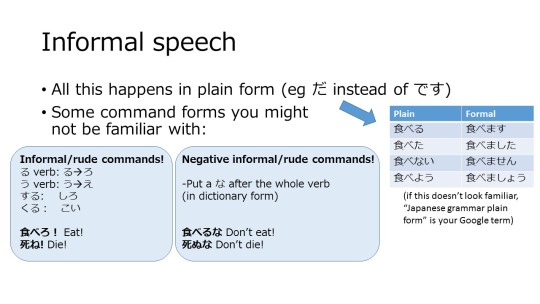
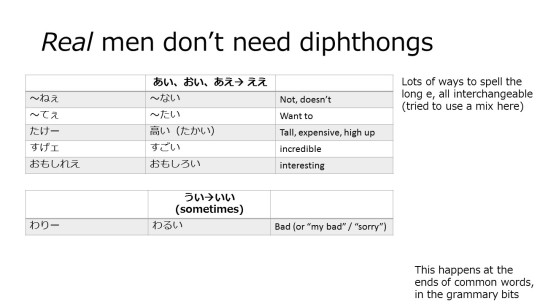
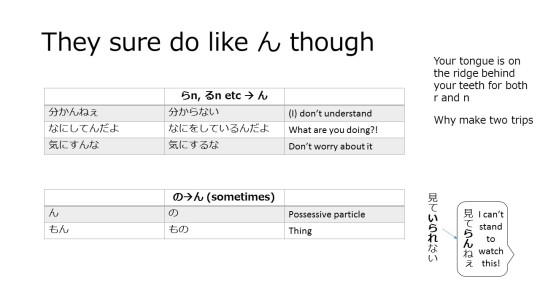

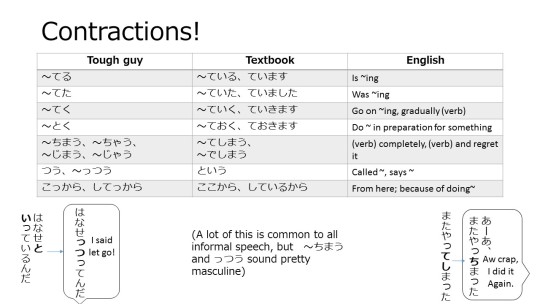
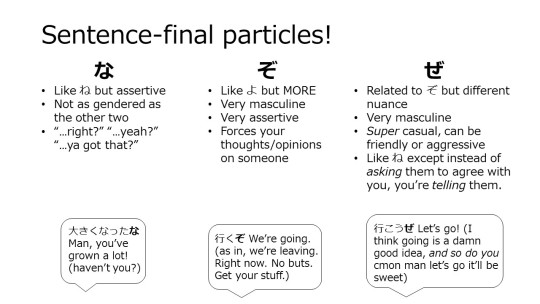
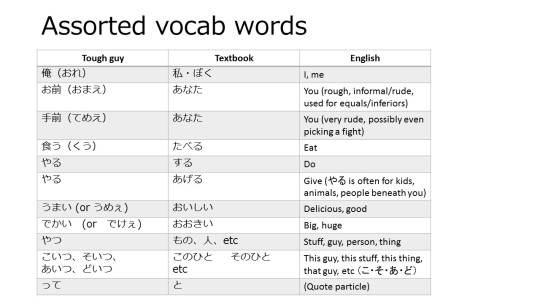

I figured I’d make a thing for anyone who needs to convert some anime tough guy talk into textbook Japanese real quick (click for big versions).
4K notes
·
View notes
Text
形容詞【けいようし】 ・ Adjectives
大きい【おおきい】 big
小さい【ちいさい】 small
可愛い【かわいい】 cute
きれい(な) pretty, clean
素敵(な)【すてき】 lovely
美味しい【おいしい】 delicious
良い【いい】 good
便利(な)【べんり】 convenient
面白い【おもしろい】 interesting
丈夫(な)【じょうぶ】 robust
重い【おもい】 heavy
軽い【かるい】 light
厚い【あつい】 thick
薄い【うすい】 thin
安い【やすい】 cheap
高い【たかい】 expensive
難しい【むずかしい】 difficult
易しい【やさしい】 easy
珍しい【めずらしい】 rare
おしゃれ(な) stylish
白い【しろい】 white
黒い【くろい】 black
赤い【あかい】 red
青い【あおい】 blue
新しい【あたらしい】 new
古い【ふるい】 old
冷たい【つめたい】 cold
熱い【あつい】 hot
暖かい【あたたかい】 warm
180 notes
·
View notes
Note
Do you know any tests for checking Japanese level?
Hi there, after a quick google I found this website which has a variety of online self-check tests to see which level of Japanese (beginner/intermediate/advanced) as well as which JLPT level (N5/N4/N3/N2/N1) you fall into.There’s also this website, and this one!
312 notes
·
View notes
Text
Clothes + verbs in Japanese
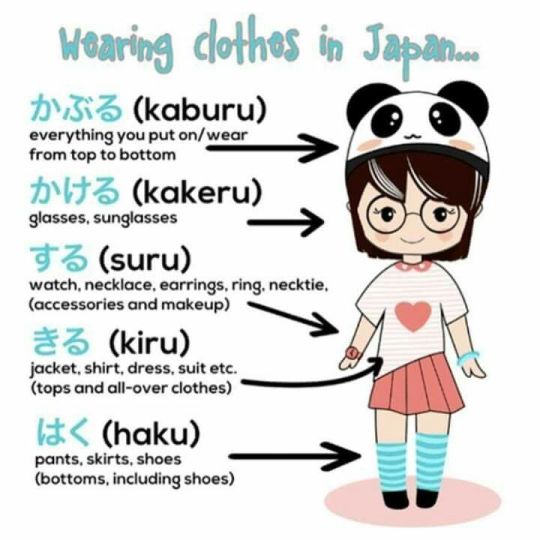
Clothes (ふく) 服
The laundry (せんたくもの) 洗濯物 (as in clothes that need washing)
Verbs related to clothes
To take off (ぬ) 脱ぐ
To do the laundry (せんたく)洗濯 [suru verb]
To hang out the washing (せんたくをほす) 洗濯物を干す
to fold (たた) 畳む
to take in (the laundry) (とりこむ) 取り込む
to do the ironing アイロンを掛ける(kakeru)
Verbs that mean „to wear”
For the items you wear on your head,
かぶる= 被る= kaburu
BUT!
ヘアーアクセサリー ( heaa akusesarii ) hair accessaries. つける / する
イヤホーン ( iyahon) earphone; イヤリング(Iyaringu) earrings つける / する
Items that you wear on top of something,
コート kouto a coat → 着る ( kiru) or はおる ( haoru) to put on or slip on
Lower body
We use はく = haku for the items you wear on your lower body.
It has two kanji. 履く& 穿く
If the items are for your feet, use 履 and if they are for your lower body — from your waist down — but above your foot, use 穿.
Since 穿く is not 常用漢字 ( = jouyoukanjuji )=designated commonly used kanji, you can write in hiranaga.)
Hands and fingers,
指輪 = yubiwa = ring → + はめる / つける / する
手袋 = tebukuro = gloves → はめる or する
More verbs:
めがねをかける。 (Megane o kakeru) I wear glasses.
“かける” to wear shades/ glasses (also means, “to hang.”)
ネクタイを締める。 (Nekutai o shimeru. ) I wear a tie.
“締める” also means, “to tie.”
スカーフを巻く。 (Sukaafu o maku. ) I wear a scarf.
“巻く” also means, “to wrap around.”
時計をする。 (Tokei o suru.) I wear a watch.
Japanese is very specific while English has only one word. I recommend looking up the collocations whenever you are unsure!

Words:
シャツ (shatsu) shirt
Tシャツ (Ti shatsu) T-shirt (there’s alsoピタT)
コート (kouto) a coat
上着 (uwagi) jacket
ジャケット (jaketto) jacket
カーディガン (caadigan) cardigan
ズボン (zubon) a pair of pants
スカート (suka-to) skirt
靴 ( kutsu ) shoes
靴下 ( kutsushita ) socks
ストッキング pantyhose
指輪 (yubiwa ) ring
手袋 (tebukuro ) glove
下着 (shitagi) underwear
香水 (kousui ) perfume
Source: Maggie Sensei
293 notes
·
View notes
Photo
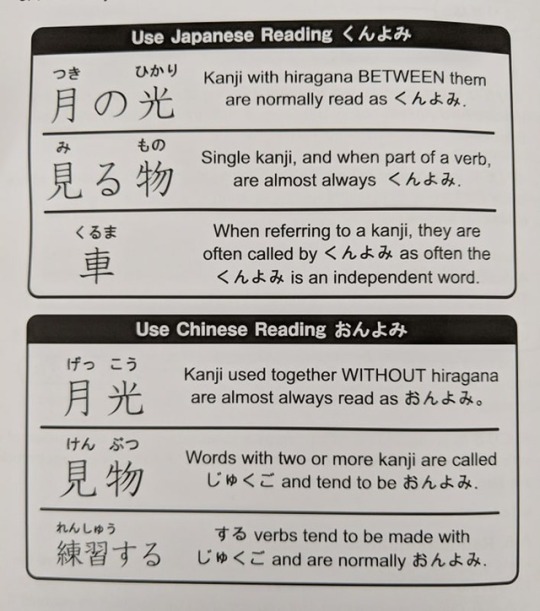
For all those times you ask yourself, “Onyomi or Kunyomi??”
8K notes
·
View notes
